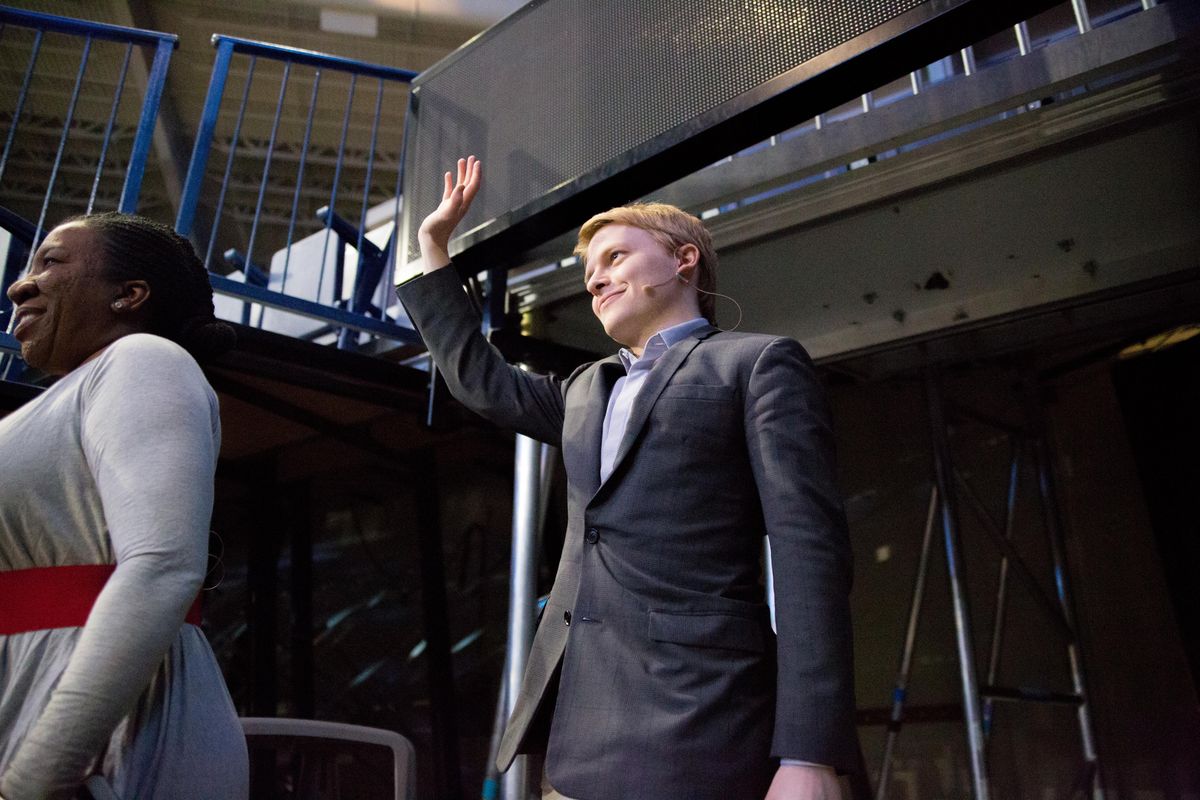‘Me too’ activist Tarana Burke, Pulitzer winner Ronan Farrow garner big crowd at Gonzaga appearance

Tarana Burke, a New York social activist who began saying “Me too” more than a decade ago to help survivors of sexual violence, believes it was a “perfect storm” of factors that finally caused the #MeToo movement to take off in October.
One of those factors, Burke said Friday evening, was the work of the man seated next to her on stage in Gonzaga University’s McCarthey Athletic Center: Ronan Farrow, the investigative journalist who just won a Pulitzer Prize for helping uncover decades of alleged sexual predation by Hollywood mogul Harvey Weinstein.
During an hourlong conversation moderated by KHQ’s Stephanie Vigil, Burke and Farrow, who have been regarded as leaders of the #MeToo movement, dissected what the movement means, where it’s headed and what more must be done to change how society responds to sexual violence and harassment.
“We have to know how to identify it first, and we have to call it out when we see it,” said Burke, who works for the Brooklyn-based nonprofit Girls for Gender Equity and graces the cover of this month’s Time magazine.
To much applause from the thousands of people in attendance, Burke later added, “If I can teach a 6-year-old not to run with scissors, and to say ‘please’ and ‘thank you,’ you can teach him to say, ‘Don’t touch this person without their permission.’ ”
As a social activist for the past 25 years, Burke said she has always questioned “why, as a community, we didn’t approach sexual violence as a social justice issue, the way we approach so many other things that are pervasive in our community.”
The moderator asked Burke to define the term “rape culture” for the audience, and her response was straightforward: “There are songs that talk about sexually assaulting women or violating women in ways that have become so normalized. Rape culture is when you are in a community and in a space where we allow jokes to be told that are degrading to women. It creates the space for harassment to happen. It creates the space for violence to happen.”
Farrow added that there is “a culture of silence, a culture of not listening when survivors talk about this. … We just don’t listen as a society.”
And Burke stressed that sexual violence affects people across all demographic lines.
“As pervasive as sexual violence is, it is also deeply isolating,” she said. “I hear it all the time. People say, you know, ‘I thought I was the only one. I didn’t know this happened to other people. I thought it was all my fault.’”
The words “Me too” help connect survivors of sexual violence and make the conversation feel less one-sided, Burke said.
“It’s really important not to ask other people to be vulnerable if you’re not willing to do that yourself,” she said. “I’m not just asking you to share. I’m not just asking you to bare your soul. I’m telling you that I’ve been through this. And I haven’t figured it all out yet, but what I’ve figured out so far is going to be helpful.”
Farrow said that his Weinstein investigation, which was published in the New Yorker magazine just as the New York Times ran its own story on the movie producer, was “not about Hollywood or Harvey Weinstein.”
“It was about systems and abuses of power, and my hope was always that those stories would continue to be told in industry after industry,” Farrow said. “It was very clear to me that there was a deep vein of untold stories about sexual violence in this country, and about the systems deployed by the most powerful men in America to shut up survivors of sexual violence.”
He said he was primarily driven by a journalistic instinct to expose injustice, but he also briefly alluded to his own family’s history of grappling with sexual violence. He is the son of actress Mia Farrow, and his older sister, Dylan Farrow, has accused their father, Woody Allen, of molesting her when she was 7.
“My sister spoke out against a powerful guy in Hollywood and faced terrible backlash from it, and faced off against a very robust PR machine that aimed to smear her,” Farrow said.
He said readers should be grateful to the women who shared their experiences, reliving trauma and confronting a potential for retaliation in the process.
“I’m just grateful every day that the story even broke,” he said, “let alone that the country is embracing it this way, and that so many brave women, and now men, have followed on by saying, ‘Yeah, I’ll share my story, too. Enough is enough.’”